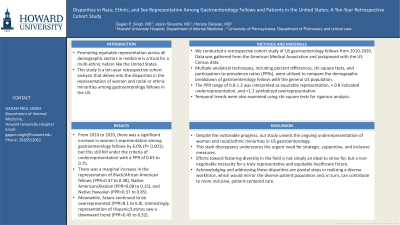Tuesday Poster Session
Category: Practice Management
P4046 - Disparities in Race, Ethnic, and Sex Representation Among Gastroenterology Fellows and Patients in the United States: A Ten-Year Retrospective Cohort Study
Tuesday, October 24, 2023
10:30 AM - 4:00 PM PT
Location: Exhibit Hall

Has Audio

Gagan P. Singh, MD
Howard University Hospital
Washington, DC
Presenting Author(s)
Gagan P. Singh, MD1, Jason Silvestre, MD1, Horace Delisser, MD2
1Howard University Hospital, Washington, DC; 2University of Pennsylvania, Philadelphia, PA
Introduction: Promoting equitable representation across all demographic sectors in medicine is critical for a multi-ethnic nation like the United States. This study is a ten-year retrospective cohort analysis that delves into the disparities in the representation of women and racial or ethnic minorities among gastroenterology fellows in the US.
Methods: We conducted a retrospective cohort study of US gastroenterology fellows from 2010-2020. Data was gathered from the American Medical Association and juxtaposed with the US Census data. Multiple analytical techniques, including percent differences, chi-square tests, and participation-to-prevalence ratios (PPRs), were utilized to compare the demographic breakdown of gastroenterology fellows with the general US population. The PPR range of 0.8-1.2 was interpreted as equitable representation, < 0.8 indicated underrepresentation, and >1.2 symbolized overrepresentation. Temporal trends were also examined using chi-square tests for rigorous analysis.
Results: From 2010 to 2020, there was a significant increase in women's representation among gastroenterology fellows by 6.0% (P< 0.001), but this still fell under the criteria of underrepresentation with a PPR of 0.63 to 0.75. There was a marginal increase in the representation of Black/African American fellows (PPR=0.37 to 0.38), Native American/Alaskan (PPR=0.08 to 0.15), and Native Hawaiian (PPR=0.37 to 0.85). Meanwhile, Asians continued to be overrepresented (PPR=8.1 to 6.8). Interestingly, representation of Hispanic/Latinos saw a downward trend (PPR=0.45 to 0.32).
Discussion: Despite the noticeable progress, our study unveils the ongoing underrepresentation of women and racial/ethnic minorities in US gastroenterology. This stark discrepancy underscores the urgent need for strategic, supportive, and inclusive measures. Efforts toward fostering diversity in the field is not simply an ideal to strive for, but a non-negotiable necessity for a truly representative and equitable healthcare future. Acknowledging and addressing these disparities are pivotal steps in realizing a diverse workforce, which would mirror the diverse patient population and, in turn, can contribute to more inclusive, patient-centered care.
Disclosures:
Gagan P. Singh, MD1, Jason Silvestre, MD1, Horace Delisser, MD2. P4046 - Disparities in Race, Ethnic, and Sex Representation Among Gastroenterology Fellows and Patients in the United States: A Ten-Year Retrospective Cohort Study, ACG 2023 Annual Scientific Meeting Abstracts. Vancouver, BC, Canada: American College of Gastroenterology.
1Howard University Hospital, Washington, DC; 2University of Pennsylvania, Philadelphia, PA
Introduction: Promoting equitable representation across all demographic sectors in medicine is critical for a multi-ethnic nation like the United States. This study is a ten-year retrospective cohort analysis that delves into the disparities in the representation of women and racial or ethnic minorities among gastroenterology fellows in the US.
Methods: We conducted a retrospective cohort study of US gastroenterology fellows from 2010-2020. Data was gathered from the American Medical Association and juxtaposed with the US Census data. Multiple analytical techniques, including percent differences, chi-square tests, and participation-to-prevalence ratios (PPRs), were utilized to compare the demographic breakdown of gastroenterology fellows with the general US population. The PPR range of 0.8-1.2 was interpreted as equitable representation, < 0.8 indicated underrepresentation, and >1.2 symbolized overrepresentation. Temporal trends were also examined using chi-square tests for rigorous analysis.
Results: From 2010 to 2020, there was a significant increase in women's representation among gastroenterology fellows by 6.0% (P< 0.001), but this still fell under the criteria of underrepresentation with a PPR of 0.63 to 0.75. There was a marginal increase in the representation of Black/African American fellows (PPR=0.37 to 0.38), Native American/Alaskan (PPR=0.08 to 0.15), and Native Hawaiian (PPR=0.37 to 0.85). Meanwhile, Asians continued to be overrepresented (PPR=8.1 to 6.8). Interestingly, representation of Hispanic/Latinos saw a downward trend (PPR=0.45 to 0.32).
Discussion: Despite the noticeable progress, our study unveils the ongoing underrepresentation of women and racial/ethnic minorities in US gastroenterology. This stark discrepancy underscores the urgent need for strategic, supportive, and inclusive measures. Efforts toward fostering diversity in the field is not simply an ideal to strive for, but a non-negotiable necessity for a truly representative and equitable healthcare future. Acknowledging and addressing these disparities are pivotal steps in realizing a diverse workforce, which would mirror the diverse patient population and, in turn, can contribute to more inclusive, patient-centered care.
Disclosures:
Gagan Singh indicated no relevant financial relationships.
Jason Silvestre indicated no relevant financial relationships.
Horace Delisser indicated no relevant financial relationships.
Gagan P. Singh, MD1, Jason Silvestre, MD1, Horace Delisser, MD2. P4046 - Disparities in Race, Ethnic, and Sex Representation Among Gastroenterology Fellows and Patients in the United States: A Ten-Year Retrospective Cohort Study, ACG 2023 Annual Scientific Meeting Abstracts. Vancouver, BC, Canada: American College of Gastroenterology.
